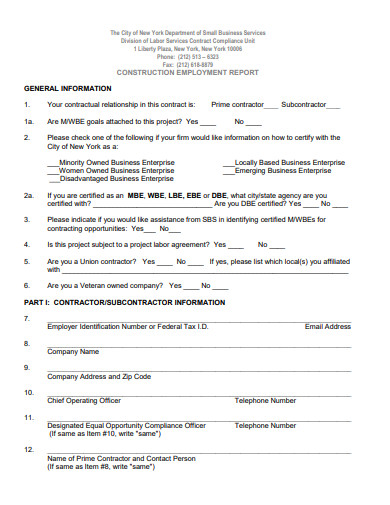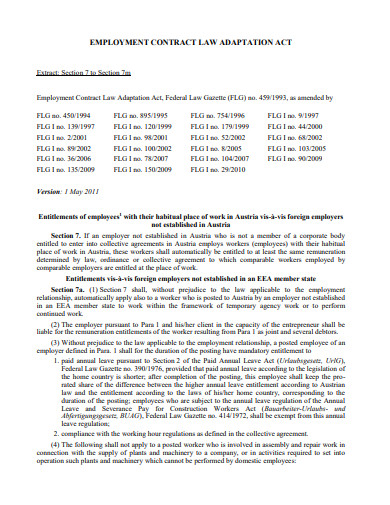Our Construction Employment Contract template isn’t merely a document; it’s a pivotal tool tailored for business growth. Structured with precision and industry insights, it safeguards both employers and their workforce, ensuring a seamless operational flow. By adopting our templates, you’re not just securing a transaction, but investing in a blueprint that streamlines processes and positions your business for success. Equip your enterprise with the essentials that matter. Make our contract templates a cornerstone of your business strategy today.
8+ Construction Employment Contract Samples
1. Construction Employment Contract Template Bundle
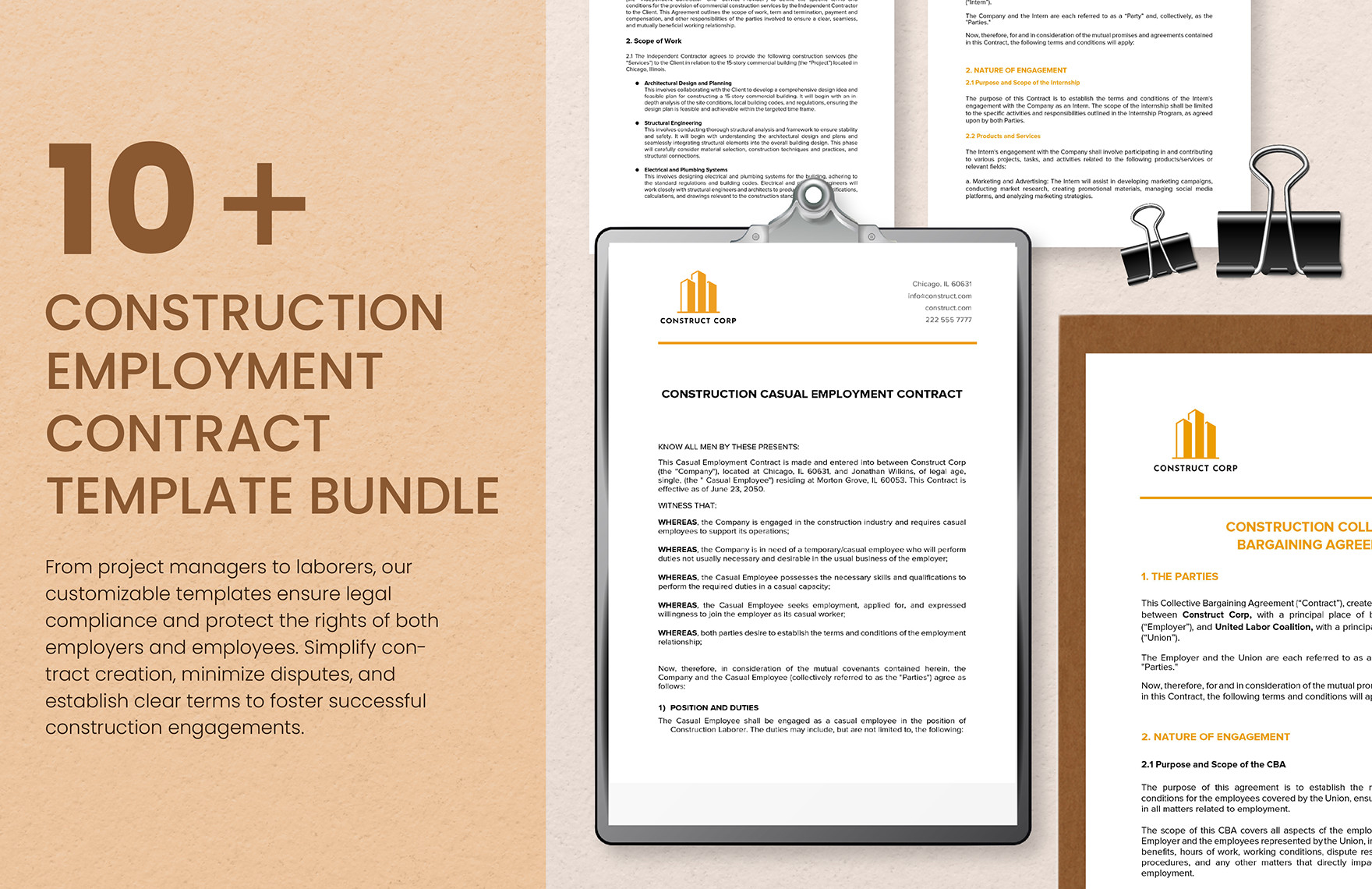
2. Construction Probationary Employment Contract Template
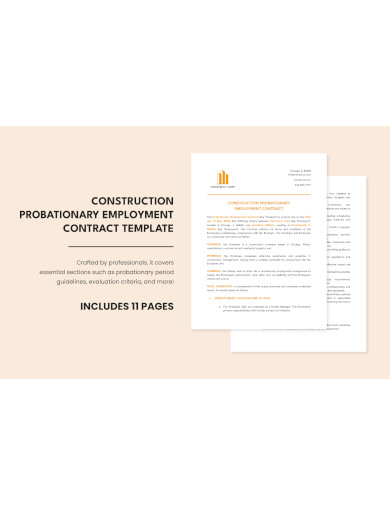
3. Construction Permanent Employment Contract Template
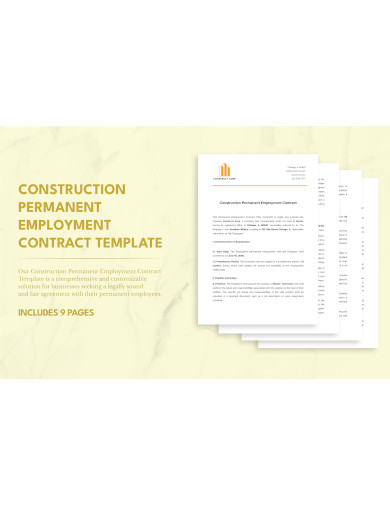
What’s a Construction Employment Contract?
A Construction Employment Contract, at its core, is a binding legal document between an employer and an employee in the construction industry. This agreement delineates the terms and conditions under which specific construction-related services are to be provided, thereby ensuring that both parties are clear on their roles, responsibilities, and expectations.
Defining the Importance
A Construction Employment Contract—sometimes referred to as a job agreement or service contract in other industries—serves multiple vital functions. Firstly, it protects the rights of both parties, setting clear boundaries and stipulations to prevent potential disputes. It provides a comprehensive description of the job, its scope, payment details, and other specifics.
Elements of the Contract
- A well-drafted Employment Agreement, specific to the construction sector, will typically contain the following elements:
- Job Description: A clear and detailed overview of the job role, including tasks, responsibilities, and any special requirements.
- Duration: The start and end dates of the contract, including any provisions for extensions or early terminations.
- Compensation: Complete details regarding salary, bonuses, allowances, and any other financial benefits.
- Termination Clauses: The grounds on which the contract may be terminated, including any notice periods or penalties involved.
- Confidentiality Clauses: To protect proprietary techniques, client information, or any other confidential data relevant to the job.
- Dispute Resolution: Mechanisms in place to handle disagreements, which might involve mediation or arbitration.
- Safety and Compliance: Terms related to adhering to safety standards and industry-specific regulations.
- By encompassing all these elements, a Construction Employment Contract acts as a safeguard, ensuring projects run smoothly and predictably. It’s not just about legalities; it’s about fostering a positive working environment, where roles are understood, and expectations are met.
How to Write a Construction Employment Contract?
Crafting a comprehensive Construction Employment Contract is an essential process that requires meticulous attention to detail and understanding of both industry standards and legal implications.
Understand the Basics
Before diving into the writing process, familiarize yourself with the fundamental elements of a service contract, particularly in the context of the construction industry. This foundation ensures the resultant contract is both robust and tailored to specific needs.
Begin with Clear Identifiers
Start by identifying both parties clearly—employer and employee. This includes names, addresses, and other relevant contact information. This clarity prevents ambiguity later on.
Define the Scope of Work
Detail the specific job responsibilities and duties expected from the employee. This section should be as detailed as possible to prevent misunderstandings. Include tasks, deliverables, milestones, and any tools or resources provided.
Compensation and Benefits
Clearly outline the salary, payment schedules, bonuses, and other financial elements. If there are provisions for overtime, insurance, or other benefits, detail them in this section.
Terms and Duration
Specify the contract’s start and end dates. Also, mention any potential for renewal or conditions under which the contract might be extended.
Termination and Breach
Outline the conditions under which the contract can be terminated, either by the employer or the employee. This should include provisions for notice periods, any compensation due to early termination, and the consequences of breach of contract.
Confidentiality and Non-compete Clauses
If there are concerns about protecting proprietary information or techniques, include a confidentiality clause. Similarly, a non-compete clause can prevent the employee from engaging in competing activities for a specified period after the contract ends.
Compliance and Safety
Mention all relevant industry standards and safety regulations that the employee is expected to adhere to. This emphasizes the importance of maintaining a safe and compliant work environment.
Dispute Resolution
Clearly lay out how potential disputes will be resolved, whether through mediation, arbitration, or legal channels. This can save time and money in the unfortunate event of disagreements.
Finalize with Signatures
After thoroughly reviewing the contract, both parties should sign and date the document, possibly in the presence of witnesses or a notary, depending on jurisdictional requirements.
In conclusion, a Construction Employment Contract is not just a formality. It’s a critical tool in defining the relationship between employers and employees, ensuring clarity, trust, and mutual understanding from the outset of any construction project.
4. Construction Casual Employment Contract Template
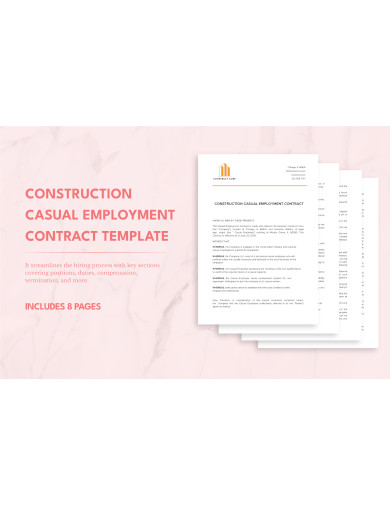
5. Construction Temporary Employment Contract Template
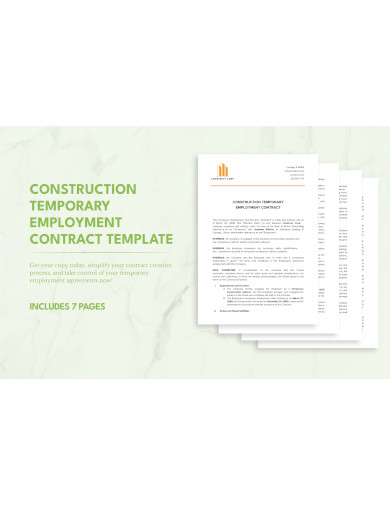
6. Construction Part-Time Employment Contract Template
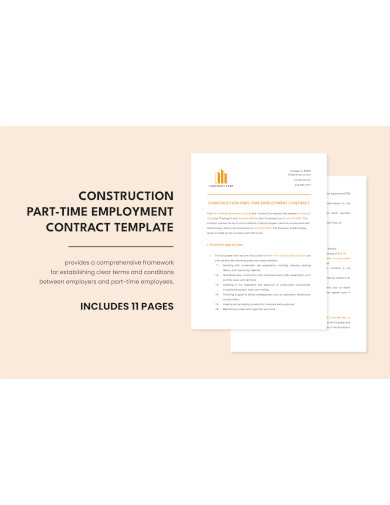
7. Construction Fixed-Term Employment Contract Template
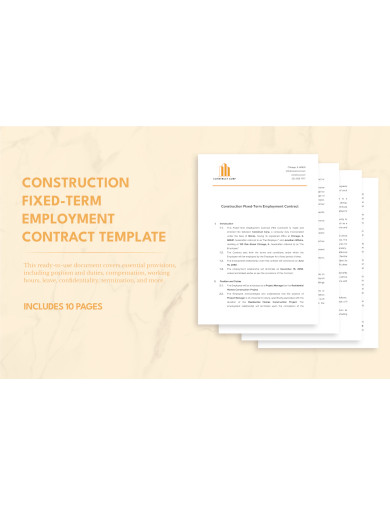
8. Construction Employment Report Contract Template
9. Construction Employment Contract in PDF
What to Include in the Construction Employment Contract?
A construction employment contract is pivotal for maintaining a transparent and smooth relationship between construction firms and their employees. By comprehensively laying down the terms of employment, it offers a roadmap for expected roles, rights, and responsibilities.
Essential Elements of the Contract
A robust construction employment contract encompasses a myriad of elements that address the diverse aspects of construction work:
- Party Identification: Clearly mention the names, addresses, and contact details of both parties – the employer and the employee.
- Scope of Work: This section outlines the specifics of the job role. From supervisory tasks to hands-on work, every responsibility should be meticulously detailed to ensure clarity and avoid disputes.
- Duration and Timeline: Set definite start and end dates for the project or employment. Additionally, include any milestones or phases integral to the project agreement.
- Compensation Details: Clearly lay down the financial aspects including the salary, bonuses, overtime pay, allowances, and the frequency of payments, whether monthly, biweekly, etc.
- Termination Clauses: Mention under what circumstances the contract can be terminated. This could range from a breach of the work contract, failure to meet milestones, or other specific conditions mutually agreed upon.
- Subcontractor Provisions: If the employment agreement permits the hiring of subcontractors, define the terms under which subcontractors can be employed, ensuring a seamless subcontractor agreement process.
- Safety and Compliance: Emphasize adherence to safety norms, regulations, and industry standards. This section ensures the work environment prioritizes the well-being of its workers.
- Confidentiality and Proprietary Rights: Protect sensitive data, construction methods, or any proprietary information by including a clause that binds the employee to maintain confidentiality.
- Dispute Resolution Mechanisms: Highlight the methods, often mediation or arbitration, to address and resolve potential disagreements or conflicts.
Bonus Considerations
While the above elements are crucial, it’s also beneficial to consider:
- Equipment and Resources: Specify who provides the tools, machinery, or any resources necessary for the project.
- Benefits and Perks: Detail any additional benefits like health insurance, paid leave, or training opportunities.
- Performance Review: Set periodic reviews or evaluations to provide feedback and address any concerns, ensuring quality work and mutual satisfaction.
How to Create a Construction Contract?
Creating a construction contract, also often termed as a project agreement or work contract, is an essential step in ensuring a successful project outcome. It requires clarity, foresight, and a good understanding of the construction process.
Begin with a Clear Template
Start with a well-structured template which can serve as a foundation. Many legal and construction organizations offer templates that can be customized as per specific needs.
Define Project Scope
Enumerate the entire scope of the project, providing comprehensive details about the expected work. Whether it’s a renovation, a new build, or any other construction type, be explicit about the tasks involved.
Financial Terms
Mention the project’s total cost, payment schedules, and any advance payments if applicable. Clarify if payments will be milestone-based or time-based, ensuring both parties are on the same page financially.
Materials and Equipment
Clearly define who will procure the materials. Include details about quality, brands, or any specific requirements. Similarly, outline equipment provisions, specifying whether they are provided by the employer, contractor, or need to be rented.
Subcontracting Clauses
If parts of the project will be outsourced to subcontractors, define the parameters of the subcontractor agreement. Ensure that the primary contractor remains responsible for the subcontractor’s work quality and adherence to the project’s terms.
Penalties and Incentives
In some cases, you might want to set penalties for delays or bonuses for completing work ahead of blank schedule. This can motivate timely completion and adherence to the project timeline.
Amendments and Changes
No construction project goes exactly as planned. Include a section that describes the process for making changes or amendments to the contract. This keeps the project flexible to some degree.
Sign and Review
Once the contract is complete, both parties should review the document meticulously. If possible, it’s beneficial to have it reviewed by a legal expert familiar with construction laws in the relevant jurisdiction. After a thorough review, both parties should sign the contract, making it legally binding.
In essence, a construction contract serves as the backbone of the construction process, offering a structured, clear, and legally sound framework that guides the project to successful completion.
Related Posts
Sample Excuse Letter for School
Feature Writing Samples
FREE 10+ Security Guard Contract Samples in PDF | MS Word
FREE 10+ Option to Purchase Agreement Samples in MS Word | Apple Pages | PDF
FREE 26+ Curriculum Form Samples in MS Word | PDF
FREE 20+ Cleaning Service Proposal Samples in PDF | MS Word
FREE 29+ Sample Loan Application Form Templates in MS Word | PDF
FREE 10+ Event Venue Contract Samples in PDF | MS Word | Pages | Google Docs
FREE 10+ SBAR Samples in PDF | DOC
FREE 12+ Music Band Contract Templates in PDF | MS Word
FREE 10+ HVAC Maintenance Contract Samples in PDF | MS Word
FREE 10+ Social Media Marketing Contract Samples in MS Word | PDF
FREE 10+ Wholesale Assignment Contract Samples in PDF
FREE 18+ Financial Proposal Samples in PDF | MS Word | Google Docs | Pages
FREE 10+ Feasibility Study Samples in PDF

